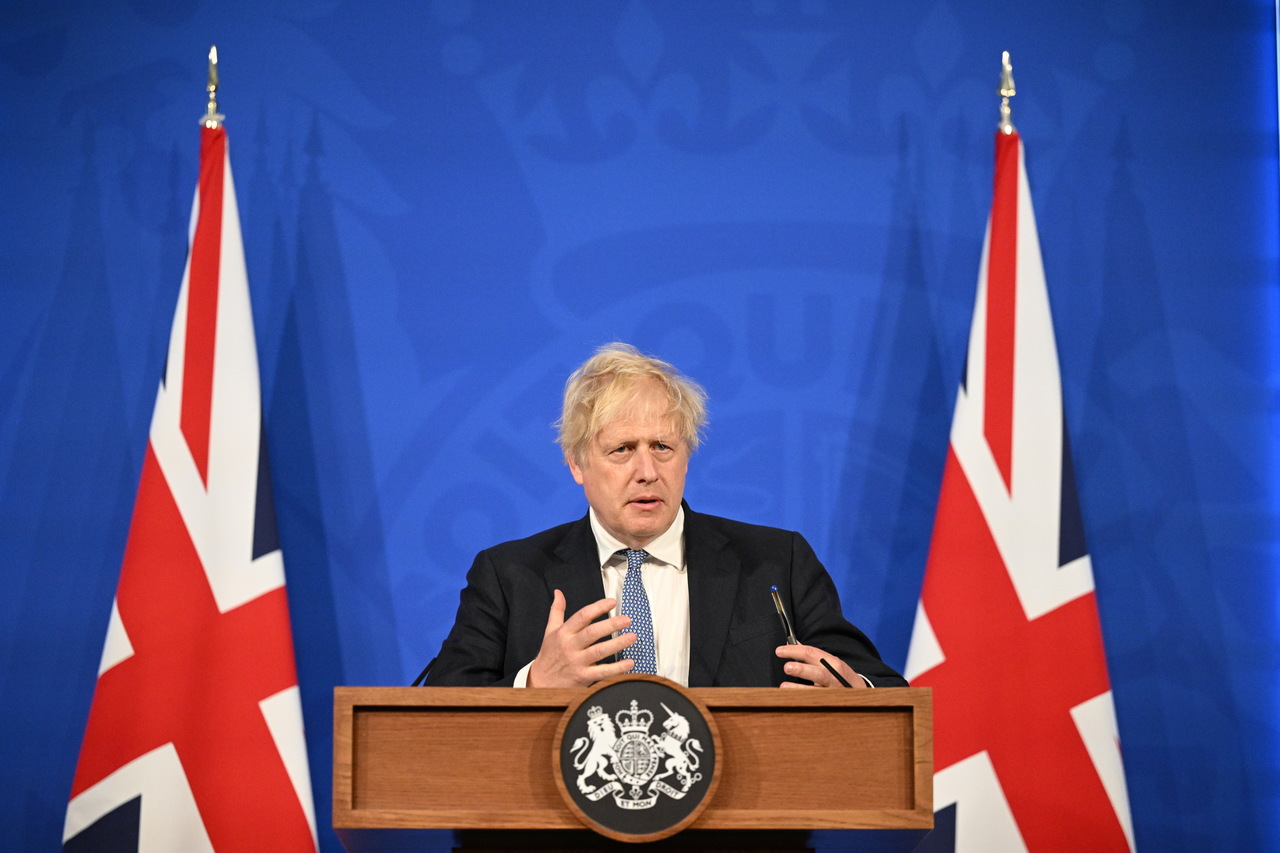Influence of UK Local and National Elections on EU-British Relations
On 5 May, local elections were held in Scotland, Wales, and parts of England, as well as assembly elections in Northern Ireland. While the results in England, Scotland, and Wales confirmed the stability of the power system in Britain, the first victory of the republican party and the lack of unionist support for the post-Brexit border solutions perpetuate the crisis in Northern Ireland. As a result, the risk of the UK unilaterally suspending the Protocol on Ireland and Northern Ireland has increased in the absence of a breakthrough in the months-long talks between Boris Johnson’s government and the European Commission (EC).
 POOL/Reuters/Forum
POOL/Reuters/Forum
Local Elections in England, Scotland, and Wales
The Labour Party was victorious among the parties running across Great Britain, gaining 3,073 out of 6,849 council seats (35% of the vote), ahead of the Conservatives (respectively, 1,403 seats, 30%) and the Liberal Democrats (868 seats, 19%). In Scotland and Wales, which operate their own devolved governance systems, the Scottish National Party (453 out of 1,223 seats) and the Welsh branch of the Labour Party (526 out of 1,232 seats) were victorious, respectively. Compared to last year’s devolved parliamentary elections in Scotland and Wales and local elections in parts of England, the Tories, who form the UK central government, have significantly lost support, albeit below forecasts (a loss of 485 seats instead of around 800). Their ratings were negatively affected by the numerous accusations against Prime Minister Boris Johnson and his associates of breaking social-distancing rules during the COVID-19 pandemic. Labour as the official opposition did not, however, develop an advantage sufficient to win the next general elections on their own. The biggest winners of the 2022 elections were the Liberal Democrats and the Green Party of England and Wales. The position of the devolved ruling parties in Scotland and Wales has also strengthened.
Northern Ireland Assembly Election Results
The largest republican party, Sinn Féin (SF), won 29% of the first-preference votes and 27 out of 90 seats, putting it ahead of the largest unionist party, the DUP (21.3% and 25 seats, respectively). The next positions were taken by the identity-neutral Alliance (i.e., not defined in terms of republicans vs. unionists; 13.5%, 17 seats), moderate unionists from the UUP (11.2%, 9 seats), republican social democrats from the SDLP (9.1%, 8 seats), radical unionists from TUV (7.6%, 1 seat) and republican Marxists from the PBP (9.8%, 1 seat). In total, unionists won 40.5% of the first-preference votes and 37 seats, republicans 41.3% and 36 seats, respectively, and identity-neutral groups 15.5% and 17 seats, respectively. The Northern Ireland electoral law (based on the single transferable vote system, or STV) was designed to focus political rivalry within the unionist and republican camps instead of between them. The results of the recent elections demonstrate the effectiveness of this design, as the 2022 electoral support for unionists and republicans generally corresponded to the Northern Ireland’s demographic structure as forecast based on preliminary data from last year’s census.
Post-Election Political Challenges in the UK. The challenges stem from the unique system of government formation in Northern Ireland, which is the result of the obligatory power-sharing between unionists and republicans introduced after the Troubles (1968-98). The results of local elections in England, Scotland, and Wales constitute an important context for the reaction of the Johnson government to the events in Northern Ireland, which in turn will affect its policy towards the EU.
The first challenge results from the rules of the political game in Northern Ireland. The election campaign was preceded by a break-up in February this year of the devolved government led by DUP and SF. The breakdown was caused by the DUP’s refusal to implement a maritime regulatory border for goods between Northern Ireland and the rest of the UK after Brexit. Subsequently, an important element of the campaign of all unionist parties was strong criticism of the model of the maritime border as a threat to the preservation of the Northern Ireland’s position within the UK. After the elections, the DUP blocked the rise of the new devolved authorities and called on Johnson again to resolve the problems arising from the Protocol in negotiations with the EU or unilaterally. DUP’s attitude reflects the specificity of Northern Ireland’s government: of the nearly 25 years of devolution, the devolved authorities did not function for a total of about 12 years.
The second challenge concerns the principles of power-sharing in Northern Ireland. The formation of the new Northern Ireland Assembly and its executive can be blocked by the largest unionist or republican party. By law, the work of the new government must be co-led by representatives of these two parties as the first minister and his deputy. Otherwise, decision-making powers automatically return to the central government in London (exercised through the politically neutral Northern Ireland civil service) and new elections are held within six months. The British and Irish governments can mediate from neutral positions in favour of an agreement between the two camps. The UK parliament, however, retained the power to legislate in favour of Northern Ireland in the devolved policy areas.
The third challenge concerns the legal structure of the Protocol itself, which in its current form is opposed by over 40% of Northern Ireland voters and a similar proportion of MLAs representing the full spectrum of unionists. The Protocol was meant to reconcile protection of the Northern Ireland peace process with defence of the integrity of the EU common market and the UK internal market. While in the EU the first aim is commonly understood as the elimination of the land border on the island of Ireland, it actually also means the inability to create extraordinary barriers at sea on the border between Northern Ireland and the rest of the UK. The peace agreements of 1998 and 2006 put Northern Ireland’s relations with the Republic of Ireland (North-South dimension) and the UK (East-West dimension) on an equal footing, and guarantee both unionists and republicans a veto on fundamental issues. Assessing whether the Protocol protects—or does not protect—the Northern Ireland peace process is ultimately reserved for their democratically elected representatives.
The fourth challenge is the “tyranny of the status quo”. The current crisis of Northern Ireland’s autonomous authorities is structurally as beneficial for the DUP as the formation of the devolved authorities is for the SF as these respective outcomes support their strategic goals through the governance mechanisms built since 1998. The stalemate removes from the DUP the responsibility for the implementation of Brexit and increases the chances of this party consolidating unionist votes in possible early elections. The impasse can also prevent the extension of the Protocol beyond 2024, which, if it happened, would equate Northern Ireland’s status with the rest of the UK. This would be a positive outcome from the DUP perspective. The formation of a devolved government would help achieve the opposite results, which is SF’s preference.
Another challenge is the renewed importance of Brexit and growing significance of unionist issues in British politics. The elections in other parts of the UK confirmed that the Tories are unlikely to lose hold of the central government quickly, while the SNP’s result justifies, in their opinion, another independence referendum (unilaterally if the central authorities object to it). This strengthens the significance of the issue of the unity of the British union and its territorial integrity for the Tories. At the same time, the erosion of Johnson’s personal position has increased the likelihood of an attempt to replace him with a new leader. The power struggle among the Tories broadens the influence of the hard-Brexiteer faction, for which the Northern Ireland issue is crucial.
Perspectives
Johnson’s visit to Belfast on 16 May served as mediation, although so far ineffective, to establish autonomous authorities. In addition, in order to ease tensions in Northern Ireland politics, on 10 May the British government announced that it would settle by acts of UK parliament the long-lasting conflict between the unionists and republicans over the status of local languages (Gaelic and Ulster Scots) and the scope of amnesty for those responsible for the deaths of civilians during The Troubles.
The combination of the political dynamics in Northern Ireland and within the Conservative Party with the lack of decisions in the months-long talks between the Johnson government and the EC on the modification of the Protocol motivate the UK government to unilaterally break the deadlock. It is possible that the UK will temporarily suspend some provisions of the Protocol under its Art. 16. However, the announcement by the head of British diplomacy, Liz Truss, on 17 May, concerning the commencement of work on a package of laws, while continuing talks with the European Commission, indicates a desire to permanently amend the Protocol. These announcements were met with negative reactions from the EC and may result in an EU-British trade war.
From Poland’s perspective, given the position of the UK as an important Polish economic partner and its consistent commitment to Ukraine and strengthening NATO’s Eastern Flank, it would be beneficial to find a compromise EU-UK solution to the conflict in Northern Ireland based on the Protocol. If it is necessary to develop new tools or procedures for the management of flows of goods across the EU’s external border for this purpose, they also could be useful for improving future goods traffic across the eastern border of Poland during Ukraine’s reconstruction and in deepening its integration with the Union.


